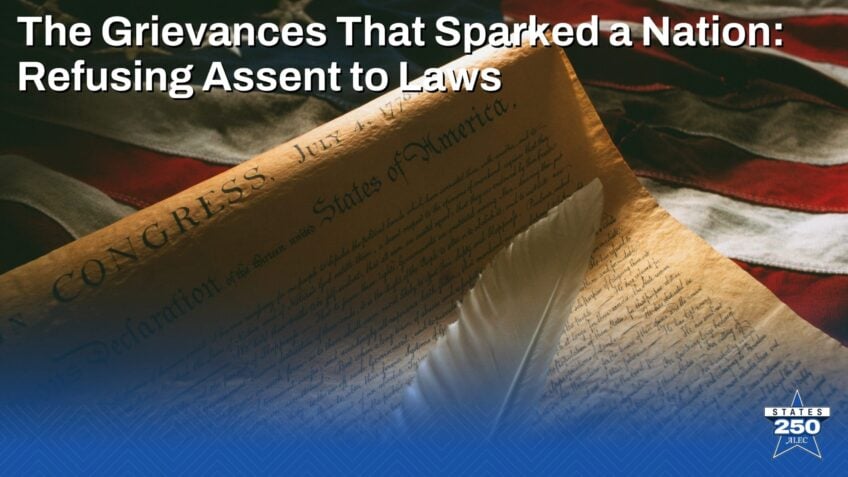The Grievances That Sparked a Nation: An ALEC States 250 Series
"He has refused his Assent to Laws, the most wholesome and necessary for the public good."
The Declaration of Independence is one of the most famous documents in the world, and it is, at its core, a list of procedural violations by the British crown.
In celebration of the 250th anniversary of the most famous objection to a breach of process, we will highlight the Founder’s grievances and how they sparked a revolution.
“He has refused his Assent to Laws, the most wholesome and necessary for the public good.”
Before America declared its independence, the colonies operated their own governments. For the most part, these governments functioned like they do today, with a colonial assembly and a governor. The governor was the King’s official representative in the colony. Early on, the governor had most of the power, but as time went on, the assemblies gained confidence and took more power away from the crown. These colonial governments evolved. What began as merely addressing immediate needs in the community became the fully functioning representative bodies . The process to establish laws started with a bill passing the Colonial Assembly before obtaining the King’s official approval-called the King’s Assent. The colonies used this process to push for more influence, even trying to get their representatives sent to Parliament.
Then came 1765.
Parliament passed the Stamp Act- an unpopular tax on paper goods meant to help offset costs of the Seven Years War. The colonists were furious. The King had “refused his Assent” to measures that would have given the colonist representation in Protests erupted. Some turned violent. The King, who had long ignored the self-governing colonies, finally took notice.
The King’s representatives agreed to pardon all those who had broken British laws while protesting, if the Colonial Assemblies paid for the damages. The colonies agreed, prompting the Massachusetts Assembly to draw up a law formalizing the pardon agreement and calling it “wholesome and necessary for the public good.”
However, the King refused his assent to the law. This blatant refusal of their autonomy sparked outrage in Massachusetts, leading to more protests and Parliament passing the Quartering Act, forcing the people of Massachusetts to allow occupation of their homes by British troops.
This moment became the first grievance the Founders listed in the Declaration of Independence.
Why? Because it cut to the heart of the matter—Government derives its power from the consent of the governed.

